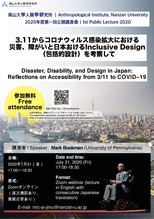研究活動 開催情報
第1回公開講演会「Disaster, Disability, and Design in Japan: Reflections on Accessibility from 3/11 to COVID-19 / 3.11からコロナウィルス感染拡大における災害、障がいと日本おけるInclusive Design(包括的設計)を考察して」 NEW!!
2020年07月14日
 |
| Poster Download .pdf |
1st Public Lecture of the Anthropological Institute 2020 "Disaster, Disability, and Design in Japan: Reflections on Accessibility from 3/11 to COVID-19"
2020年度第1回公開講演会「3.11からコロナウィルス感染拡大における災害、障がいと日本おけるInclusive Design(包括的設計)を考察して」
日時/Date and Time 2020年7月31日(金) July 31, 2020(Fri) 17:00~18:30
開催形式/Format Zoom Webinar(オンライン)
言語/Language 英語(日本語による逐次通訳あり) /Lecture in English with consecutive Japanese translation
定員に達したため受付終了しました。講演会終了後、講演部分を公開する予定です。詳細は、南山大学人類学研究所のウェブページをご覧ください。
As we have reached the participation limit, registration is now closed. We will make the lecture portion of the presentation available for viewing online at a later date. Please find details on the Anthropological Institute, Nanzan University website.
http://rci.nanzan-u.ac.jp/jinruiken/
※参加を希望される場合は、事前に受付フォームよりお申し込みください。(申し込み締切:7月31日正午 定員:100名)
※If you wish to participate, please fill out the online registration form (deadline 12:00 JST July 31, 2020. Participation limited to 100 people)
主催 南山大学人類学研究所 Nanzan University, Anthropological Institute
プログラム Program
17:00-17:05 Introduction: Benjamin Dorman (Anthropological Institute)
17:05-17:50 Lecture : Mark Bookman (University of Pennsylvania)
17:50-18:30 Q&A
Abstract
The spread of COVID-19 across Japan has exacerbated accessibility issues born out of the nation's past, creating difficulties for disabled people in the present and anxieties about the future. In this article, I consider some of the historical contingencies and geopolitical circumstances that have fueled a precarious pipeline to risk and institutionalization for many disabled individuals. My analysis reveals how inadequate installation and inappropriate use of accommodations like ramps and elevators in various public venues has prevented disabled people from obtaining key supplies. It suggests that some disabled people have survived the current moment by relying on professional caregivers, but others have been unable to do so due to service cancellations and fear of contagion.
For individuals without support networks, assisted living facilities have offered a means of survival. However, many assisted living facilities have long grappled with funding issues and lack of willing workers. Accordingly, their residents have been exposed to neglect, abuse, and now, viral infection.
Aware of the situation, government officials have instituted emergency policies to provide disabled people and assisted living facilities with personal protective equipment and flexible financing. And yet, as activists have argued, those policies have often failed to pan out in practice. The future of disability in Japan remains uncertain. But as I suggest, the current crisis is our chance to intervene. I contend that we must use this opportunity to identify and resolve barriers to accessibility in Japan and build an inclusive society for domestic and international populations of disabled individuals.
Keywords COVID-19; Vulnerable Populations; Disability; Accessibility; Institutionalization
概要
日本国内におけるコロナウイルス感染拡大は、従来から注目されてきたアクセシビリティの問題をさらに困難な状況へと悪化させている。特に障がいを持つ人々にとって、こうした現状は将来への不安にもつながる。そこで本発表では、障がいを持つ人々に対してさらなるハイリスクをもたらす状況に関し、歴史および地政学的な見地から考察をおこなう。私の分析は、例えば公共施設のスロープやエレベーターといったものの不適切な設置や使用が、いかに障がいを持つ人々が必要なものを入手することの妨げとなっているのかを明らかにするものである。一部の障がい者は、専門の介護サービスに頼ることで、その場では助かった。しかし一方で、多くの障がい者は、コロナウイルスへの感染を恐れた介護サービスから拒絶されたことにより、それらの利用を制限された。
支援のネットワークを持たない障がい者にとって、障害福祉施設は生存のための手段として重要である。しかし多くの障害福祉施設は、資金不足や人材不足の問題に直面している。このような状況下で、施設利用者はネグレクトや虐待を受けることもあり、それに加えて現在はコロナウイルスの感染拡大の危機もある。
そこで政府は緊急方針を発令し、障がい者や障害福祉施設に、個人向けの感染予防用の器材の提供としかるべき資金援助をおこなった。それでもアクティビストが主張するように、このような政策はしばしばうまく機能しない。日本における障がい者の将来の見通しは未だ不透明なのである。しかし私は、こうした今ある危機こそ我々が介入するチャンスであると考える。私は、今こそ日本におけるアクセシビリティに対する大きな障壁を解決し、国内外の障がいを持つ人々、個人個人を包括する社会を構築すべきだと主張する。